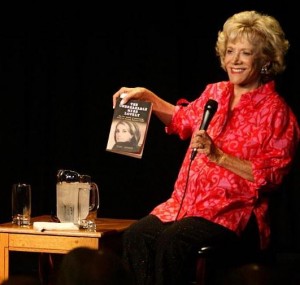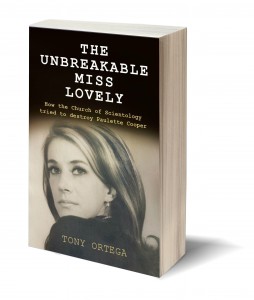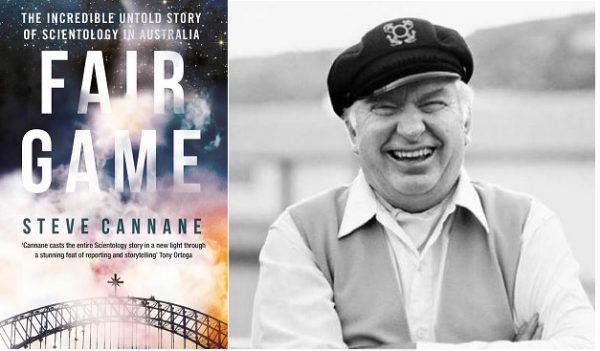We’re very happy to see that Steve Cannane’s book, Fair Game: The Incredible Untold Story of Scientology in Australia has been getting a lot of press since it was released on September 19. Naturally, media reports have tended to focus on celebrity hijinks in the book, as well as recent stories of abuse in Scientology that Steve uncovered.
But one of the things we enjoyed most about Steve’s book — and frankly, didn’t expect from a book with a focus on Australia — was the tough new look it takes at Scientology’s founder, Nebraska-born L. Ron Hubbard.
Cannane takes a brutal look at Hubbard’s background, and he seems astonished that given Hubbard’s personal history anyone took him seriously at all. In 1948 Hubbard was brought so low, he was prosecuted in San Gabriel Township Court in Southern California for writing bad checks. Steve writes, “Following his visit to the San Gabriel Township Justice Court, Hubbard could have been classified as a petty thief, a con artist, a bigamist, a wife-beater, a dead-beat dad, a valour thief, a malingerer and a liar. Yet his next scheme was to convince others that he had found a way to solve any and all of their life problems. Hubbard was working on a book he would ultimately describe as a ‘milestone for Man comparable to his discovery of fire and superior to his inventions of the wheel and arch.'”
It does seem astonishing, when you think about it.
After that book, Dianetics, came out in 1950, Hubbard’s life radically changed. By 1968, Hubbard had given himself the title of “Commodore” of his own private navy as he ran his worldwide Scientology organization from the helm of the ship the Royal Scotman (later renamed the Apollo). And it was there on the ship that one of the most remarkable episodes recounted in Cannane’s book takes place — when Hubbard, at least for a short while, leveled with a journalist about how Scientology was all a con job.
Cannane has generously given the Underground Bunker permission to run an excerpt from Fair Game that recounts the 1968 encounter between Hubbard and Charlie Nairn, who filmed Granada Television’s World in Action documentary, The Shrinking World of L. Ron Hubbard. As Cannane explains, Nairn tracked down Hubbard aboard the Royal Scotman in Tunisia, and approached him late one night, finding Hubbard alone on the ship’s deck. The conversation that Nairn then had with Hubbard, as described by Nairn, is pretty astonishing.
“This is one of my favorite revelations in Fair Game,” Cannane tells us. “Charlie Nairn is a highly credible award winning documentary maker. The conversation he recounted to me gives a fascinating insight into Hubbard’s motivations. The image of him comparing Scientology to fly-fishing – of luring people in – and getting a thrill out of the art of deception completely makes sense when you look at how Hubbard treated his followers.”
Here’s the excerpt from Fair Game recounting Nairn’s encounter with Hubbard. We hope it motivates you to buy your own copy of the book, which is chock-full of similar revelations about Hubbard and Scientology.
At the time Hubbard was bouncing between Mediterranean ports aboard his ship the Royal Scotman. Nairn worked out through marine radio channels that Hubbard had dropped anchor in the Tunisian city of Bizerte. The World in Action crew hotfooted it to North Africa. When they arrived, Nairn headed straight for the docks. It was after midnight, and the filmmaker was alone. He looked up at the Scientology ship and saw the outline of an older man in a Captain’s hat smoking away. Nairn was sure it was Hubbard and decided to try his luck:
“I went up the gang-plank, up to the bridge. He was alone. I said, ‘Hello’. I made my excuses, told him that I wasn’t a Scientologist like all those sleeping innocently below but that I was a young film-maker fascinated by the process of inventing a religion. Immediately he seemed interested, intrigued – there was absolutely no whiff of a ‘what are you doing on my ship?’ response. I remember telling him about why I was interested in this – about my mother”
According to Nairn, Hubbard was undeterred by the provocative premise of his interest in him. He welcomed the conversation and the pair talked for over an hour. The filmmaker asked Hubbard why he invented Scientology. As around two hundred Scientologists slept in their bunks on the Royal Scotman, he gave Nairn an answer he could never have uttered if his followers were awake, “He said it started out purely as a way to make money,” says Nairn, “This did seem to me the most extraordinary and fascinating opening. There he was saying this – that the whole thing was just a ‘con’ – very simply – with two hundred, or whatever it was, Scientologists innocently asleep just below us.”
As the conversation developed, Hubbard told Nairn that making a buck was not the only motivating factor. “He did say that although the initial thing was money, he had also become fascinated by ‘catching’ people, especially clever people, at luring them in,” recalls Nairn, “I remember him saying it reminded him of fishing with his father. You cast out your line to fool a beautiful silvery fish – that was the whole fun of it – of tricking it and luring it in, deceiving it.”
Hubbard explained to Nairn that as a child, he and his father made fishing flies and lures together, experimenting with what would work, and what wouldn’t. According to Nairn, Hubbard said, “I never understood why a beautiful fish could be caught by a fake fly.” Hubbard was admitting his life’s work was, like fly-fishing, all about camouflage and deception. Hubbard mused about how intelligent people got caught up in Scientology. “I remember him specifically talking about two medical doctors, (who got involved in Scientology) as if they should have known better,” says Nairn. “I remember a sense of triumph from him over this idea – as if he felt some of his victims were maybe brighter than he was – but that they were needy, gullible – that he understood the human animal and its ‘needs’ – exploitable needs – backwards.”
But a sense of triumph was not all that Nairn got from Hubbard, “I also got a feeling of someone who didn’t actually seem to have much self-confidence, who was ‘boosted’ by the respect and reverence that people he thought more intelligent than he was were prepared to pay him. And I’d say there was a funny mixture of triumph over his victims but then, once caught, a lack of respect for them – and now I wonder if that was what he ultimately couldn’t stand – and so all those later stories of his towering rages…Did he kind of ‘hate’ his victims? I got that feeling pretty strongly.”
As their late night conversation continued on the bridge of the Royal Scotman, Nairn put forward his idea of why intelligent people were so easily conned. “It’s because you are filling up the god-shaped hole,” Nairn told him. It must have been a confronting conversation for Hubbard. A young upstart filmmaker turns up unannounced and wants to ask provocative questions about how he invented a religion and how he was conning all those sleeping below the decks. Nairn says at no point did Hubbard argue with him, or shout at him, or ask him to leave, “What he absolutely didn’t say is, ‘No, that’s not what I’m doing, you haven’t understood.'”
Charlie Nairn felt Hubbard wanted to keep talking about the very topic you would least expect him to want to discuss with a documentary maker. “He settled down, in relief I’d say, finally to be able to talk to someone about inventing a religion and conning people – and I’d now say the trap he found himself almost intolerably stuck in,” says Nairn.
A thought nagged away at the young filmmaker as Hubbard expanded on the theme, “I could well understand hopping into bed at night with one’s wife, rubbing one’s hands together and saying ‘we made $10,000 today dear’,” says Nairn, “but I couldn’t understand his own wife believing it all, believing in out-of body experiences and previous lives. I couldn’t imagine lying in bed with someone who ‘believed’ my con. And being surrounded all the time only by believers – all those people sleeping peacefully below us, all believing in him.” Nairn asked Hubbard whether he felt trapped. Whether his situation made him feel utterly lonely? “That’s when he said – very, very slowly and with a smile that I can remember still – that was the first interesting question he had been asked in 20 years.”
Nairn thought he had hit the jackpot. Not only had he tracked down the elusive Hubbard in a remote port, but he had got him to talk openly about the topic Nairn was so desperate to make a film about.
He asked Hubbard if he would be interviewed on camera. Hubbard agreed. Nairn went away and woke up his film crew. By the time they had returned it was around 3 am. But the mood, the entire scenario had shifted significantly. There were now around thirty Scientologists surrounding Hubbard. He could not repeat the kinds of things he had been so happy to talk about just hours earlier. “They were standing behind me, getting edgy if I pushed Hubbard,” says Nairn, “I did try asking him ‘the first interesting question I’ve been asked in 20 years’ again – but it didn’t work. He was back in front of the conned – so therefore back in his trap.”
Nairn could not replicate the frank and intimate conversation he had with Hubbard just hours earlier. The on-camera interview still provides extraordinary insights into the character of Hubbard. The Shrinking World of L. Ron Hubbard is still quoted and used by journalists and documentary makers across the world. But over forty-five years later Nairn sees what he missed, not what he captured. “I’ve always hated the results because it was all a million miles from our conversation about dreaming up a religion and God-shaped holes of an hour earlier,” says Nairn. “Of course, thinking afterwards, he couldn’t possibly have said any of this in front of his disciples, could he? Thinking about it now, how could Hubbard have ever got away from the monster he created? What would have been in it for him to stand up and say he didn’t believe?”
We’re struck by the idea of Hubbard admitting not only that Scientology was all a con, but that he had become trapped by it and was really a kind of prisoner of the thing he had invented.
We showed the passage from the book to Hana Whitfield, who had served Hubbard as captain of the Apollo, and worked closely with him for years. Hana shared the excerpt with her husband, Jerry.
“We both feel it’s plausible. Why? It was 2 am or thereabouts when Charlie Nairn caught Hubbard alone on the deck. It’s the time of night when people are most vulnerable, their triggers are down, they sleep best, they die, and so on. Hubbard was alone. No one to pull him back into the present. He may well have ‘let go’ and been only too happy to let it all out,” she says.
“I remember one event in 1969, after the Whole Track Recall Mission, when Hubbard told me he had appointed me as the chairman of a committee of evidence on a close friend. I remember the way Hubbard looked at me sideways, as if he was testing me, saying, ‘And you know this person is guilty, right?’ And another time he ordered that an electrician be kept awake for as long as it took to get a Sharps ship-to-shore radio installed on the Avon River or else the person would forever have to sleep on deck and be denied eating with the crew. It took 4 days. He was testing me. Oh yes, this is plausible. Of course, most of us now know it was a con. But to many it is and is still going to be a very hard reality!”
——————–
 ‘The Unbreakable Miss Lovely’ audiobook now on sale
‘The Unbreakable Miss Lovely’ audiobook now on sale
Audible.com has released the audiobook version of The Unbreakable Miss Lovely: How the Church of Scientology tried to destroy Paulette Cooper and you can get the book for free if you’re signing up at Audible for the first time!
Read by the author (that’s us), the book tells the incredible tale of a journalist who was among the first to expose Scientology’s controversies, and nearly paid for it with her life. Go to Audible’s website for more details — [US version] [UK version]
To support the Audible launch, Paulette Cooper joined us for an “Ask Me Anything” session at Reddit on September 29, which covered a lot of topics about the book and about this website.
——————–
 Posted by Tony Ortega on September 30, 2016 at 07:00
Posted by Tony Ortega on September 30, 2016 at 07:00
E-mail tips and story ideas to tonyo94 AT gmail DOT com or follow us on Twitter. We post behind-the-scenes updates at our Facebook author page. After every new story we send out an alert to our e-mail list and our FB page.
Our book, The Unbreakable Miss Lovely: How the Church of Scientology tried to destroy Paulette Cooper, is on sale at Amazon in paperback and Kindle editions. We’ve posted photographs of Paulette and scenes from her life at a separate location. Reader Sookie put together a complete index. More information about the book, and our 2015 book tour, can also be found at the book’s dedicated page.
Learn about Scientology with our numerous series with experts…
BLOGGING DIANETICS: We read Scientology’s founding text cover to cover with the help of L.A. attorney and former church member Vance Woodward
UP THE BRIDGE: Claire Headley and Bruce Hines train us as Scientologists
GETTING OUR ETHICS IN: Jefferson Hawkins explains Scientology’s system of justice
SCIENTOLOGY MYTHBUSTING: Historian Jon Atack discusses key Scientology concepts
Other links: Shelly Miscavige, ten years gone | The Lisa McPherson story told in real time | The Cathriona White stories | The Leah Remini ‘Knowledge Reports’ | Hear audio of a Scientology excommunication | Scientology’s little day care of horrors | Whatever happened to Steve Fishman? | Felony charges for Scientology’s drug rehab scam | Why Scientology digs bomb-proof vaults in the desert | PZ Myers reads L. Ron Hubbard’s “A History of Man” | Scientology’s Master Spies | Scientology’s Private Dancer | The mystery of the richest Scientologist and his wayward sons | Scientology’s shocking mistreatment of the mentally ill | Scientology boasts about assistance from Google | The Underground Bunker’s Official Theme Song | The Underground Bunker FAQ
Our Guide to Alex Gibney’s film ‘Going Clear,’ and our pages about its principal figures…
Jason Beghe | Tom DeVocht | Sara Goldberg | Paul Haggis | Mark “Marty” Rathbun | Mike Rinder | Spanky Taylor | Hana Whitfield







